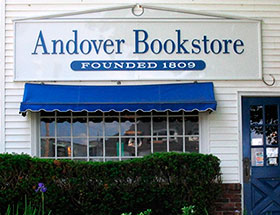Confessions of a mourning consumer: How I killed my local bookstore


Yes, I killed my local bookstore.
I live in Andover, Massachusetts, a quaint, church-steepled New England town about 25 miles north of Boston. There are two things you need to know about Andover: It is home to Phillips Academy, one of the nation's oldest and most elite prep schools, and Andover Bookstore, the country's second oldest continuously operated bookstore.
The 205-year-old store is the heart of Andover's cultural community, a gathering place for storytelling, author events, book groups and poetry readings. It's a place to browse and socialize and sit by the fireplace and nibble on a cookie and read. As one small boy is said to have declared, "This is like a library and a living room together."
The store's upper level is devoted to textbooks. Three times a year, students from Phillips Academy (just up the street) gather here to discover -- and purchase -- their reading assignments for the upcoming trimester. For 200 years, the Andover bookstore has served as the school's official text book dealer. Until now.
Last month, Phillips switched to an online dealer, instantly wiping out a full 50 percent of the already struggling bookstore's business. Harsh words have been hurled at the school's heartless decision, but I think the truth needs to be told:
I killed the Andover Bookstore.
And it was no accident or act of passion, either. This was pre-meditated -- a slowly and deliberately executed plot.
Here's how I did it:
- In 1996, I ordered my first book from Amazon. (A primer on writing HTML.)
- In 1997, I started our family's annual tradition of ordering the latest Harry Potter books from Amazon.uk.
- By 2000, I was regularly taking my children showrooming to the Andover bookstore. Sometimes we'd buy a book or two. But more often than not, I would tell them that Dad wanted to save some money, so we'd either go to the library or go home and order online.
- In 2005, I joined Amazon Prime (free two-day shipping!) and launched my annual habit of placing a big December order that took care of much of my holiday shopping.
- In 2009, I set up my small church as an Amazon Associate. We encouraged members to shop Amazon by clicking through from our church site -- adding a few extra dollars to the church's coffers.
- By 2012, my son and daughter were saving a few dollars buying their college textbooks from Amazon instead of their respective campus bookstores. Dad had taught them well.
So, why did I do it?
Online shopping was convenient, economical and, well, cool... Over the years, I'm sure I saved a few hundred dollars. It really did seem like a good idea at the time. I'd forgotten that some things are worth paying a bit more for.
Yes, I'm guilty. But I wasn't thinking clearly. Is it too late to enter an insanity plea? Is it too late to try and make things right?
If I could do it all over again, I'd trudge through the snow, sit by the fire, nibble on a cookie, and spend a few dollars more. I'd buy all my books local.
And from now on, I will. Because I've made a decision:
No. More. Amazon. Ever.
Sure, Amazon's new Firefly-enabled Fire phones can put my next online purchase just a click away from wherever I am and whatever I see, whenever I want anything -- but I am saying no more!
No. More. Amazon. Ever.
In fact, why not turn Amazon's insidious showrooming model on its head?
Here's my plan: I will continue to do all my book (and other product?) browsing and searching on Amazon. I will continue to add my planned purchases to my shopping cart (or wishlist), and then...THEN... I will export that list to an app. (Is there an app? We need an app. Developers, please contact me.)
This App (let's call it the "Unamazon App") will:
- Review my item's SKUs;
- Find the brick and mortars closest to me that stock (or are prepared to order) these items;
- Optionally, ping these local retailers to initiate the order; and
- Notify me when items are ready for pickup or (optionally) shipment.
Will this be as cheap and easy -- as frictionless -- as buying from Amazon? Of course not. But it's my never-ending quest for cheap and easy -- my greed -- that got us into this mess in the first place.
Let's add a little friction back into the buying experience.
Friction can feel good, after all. Without any friction, heck, we're just floating in space.